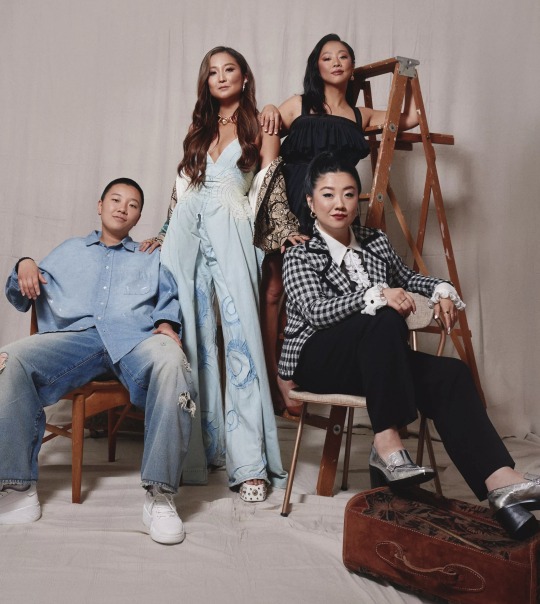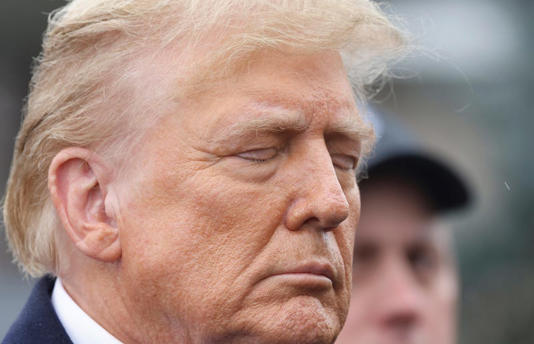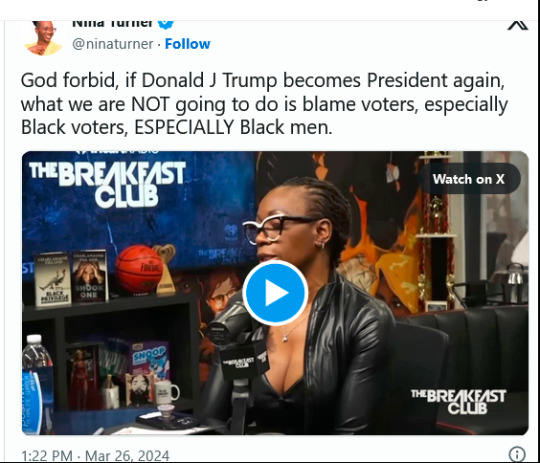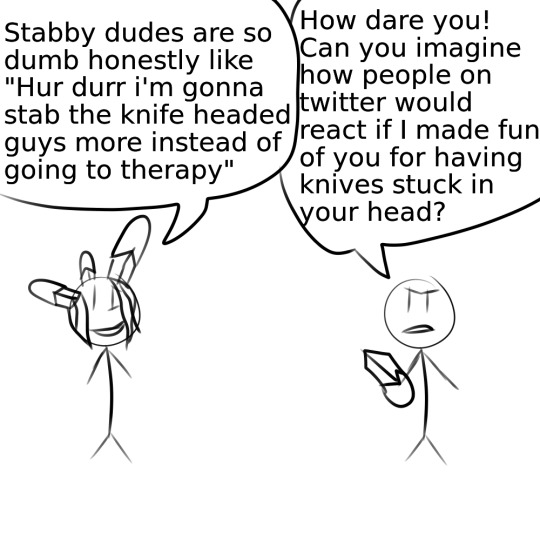#Race in America
Text
What I need for White Americans (ppl in general really, but I'm talking to the U.S.) to understand about Americans of Color is that You don't know Us, but We know YOU.
We've spent generations upon generations of our entire lives learning YOUR social norms, forced to assimilate to YOUR idea of society. We live and learn entirely separate cultures, but we also learn from birth what it means to have to cater to Whiteness in America. It's why I can name so many famous movies with white casts, but most white people didn't even know where "Bye Felicia" came from. It's why I was raised to professionally Code Switch from childhood, but grown white people struggle to even grasp the basics of the grammar of AAVE. It's why people who speak different languages think they have to give up their own mother tongue just to function in this country.
It's why you all are so uncomfortable with the idea of people of color questioning and rejecting what seems "normal" to you- and to be honest, I actually think older white generations are better at admitting this than younger ones. It's because what you know as normal is usually not "normal"- it's White. Whiteness is just as loud as any other presentation of race in this country, you just don't see it that way because everyone else has been forced to maintain your comfort. The entire system is built around it, and you don't even know it.
It's why it frustrates white Americans of some marginalization- queer, disabled, neurodivergent- because you do not have access to the "norm" as it is shown to you. But that frustration- literally everyone of color (who shares those identities btw) lives under that understanding.
Idk, I didn't really have a direction. I just think it's wild how so many conversations require this... Constant Verbal Leveling of the Playing Field simply because Whiteness blinds white people to what things ACTUALLY look like out here.
8K notes
·
View notes
Text

88 notes
·
View notes
Text
In this column, Charles Blow provides the historical context for Juneteenth, and the continuously "evolving" struggle for "freedom" for Black people in the U.S. This is a gift🎁link, so anyone can read this entire column even if they don't subscribe to the NY Times. Below are some excerpts:
Last week at a Juneteenth concert on the South Lawn of the White House, Vice President Kamala Harris said that on June 19, 1865, after Union troops arrived in Galveston, Texas, “The enslaved people of Texas learned they were free.” On that day, she said, “they claimed their freedom.”
[...]
Although it’s a mark of progress to commemorate the end of American slavery, it’s imperative that we continue to underscore the myriad ways in which Black freedom was restricted long after that first Juneteenth.
[...]
Most Black people couldn’t claim their freedom on June 19, 1865, because their bodies (and their free will) were still being policed to nearly the same degree and with the same inveterate racism that Southern whites had aimed at them during slavery.
The laws governing the formerly enslaved “were very restrictive in terms of where they could go, what kind of jobs they could have, where they could live in certain communities,” said Daina Ramey Berry... the author of “The Price for Their Pound of Flesh: The Value of the Enslaved, From Womb to Grave, in the Building of a Nation.”
[...]
Upon arrival in Galveston, the Union general Gordon Granger delivered General Order No. 3, which said “the connection heretofore existing” between “former masters and slaves” would become “that between employer and hired labor” and that “freedmen are advised to remain quietly at their present homes and work for wages.”
The order also had a curious stipulation: that freedmen would “not be supported in idleness.”
[...]
A notice from Granger published days later in The Galveston Daily News informed the public that “no persons formerly slaves will be permitted to travel on the public thoroughfares without passes or permits from their employers.” In other words, white people would still dictate where Black people could be.
In 1866, a Texas state constitutional convention adopted the state’s Black Codes, codifying suffocating limits on Black autonomy. As the Texas State Library and Archives Commission describes these laws:

In this way, the codes “outlined a status for African Americans not too much removed from their earlier condition as slaves.”
Beyond this, for Black people in the 1870s, being a convict in Texas essentially meant relegation to enslavement, because that was when the state’s convict leasing program took off.
[...]
The question of labor is at the core of how we must understand emancipation and Reconstruction because American slavery, an entire capitalist system representing billions of dollars in wealth, was built on free Black labor, was brought to its knees and would have to be propped up; newly freed Black people were fed back to the machine to keep it running.
[...]
As Corey Walker, the director of the program in African American studies at Wake Forest University, emphasizes, the idea of freedom, particularly for Black people in this country, is continuously being negotiated and contested, so “Juneteenth marks a moment in the ever-evolving and expanding project of American democracy.”
“It is,” he said, “a project that is never complete. It is never fulfilled, even at the moment of Juneteenth. And it’s one that is ever evolving to this day.”
[emphasis added]
#juneteenth#race in america#freedom came with strings attached#slavery#black americans#black history#charles blow#the new york times#gift link
46 notes
·
View notes
Text
Annabeth being a Black girl puts the scene with the cop - and with Echidna - in a different light. It makes sense and I'm also much more scared for the trio as a result.
#pjo#pjo tv show#pjo spoilers#pjo tv spoilers#race#race in america#leah sava jeffries#annabeth chase
35 notes
·
View notes
Text


How the ‘Joy Ride’ cast brought debauchery to an Asian American friends trip
#entertainment#movies#joy ride#sabrina wu#stephanie hsu#sherry cola#comedy#asian american#asian american women#aapi#race in america#women in america#ashley park
115 notes
·
View notes
Text

I assume that JChoe is alluding to the fact that Rockwell also did works like this (titled “The Problem We All Live With”) a bit later.

#twitter screenshot#race in america#race in the us#norman rockwell#original post#everyone i disagree with is a Nazi
8 notes
·
View notes
Text
Donald Trump's Hate Has No Place in Black America. Let's Remind Him in November.

We are seven months out from the most consequential election in our nation’s history, and Black voters know what’s up: A recent survey conducted by Black pollster Cornell Belcher’s firm asked 800 Black voters in battleground states to identify the single greatest threat to the Black community.
Their answer? A second Donald Trump presidency.

We should not be surprised by this finding. Trump is prepared to enact – and in many cases, reenact – policies that will do great harm to the Black community and to communities of color. He is expected to authorize mass deportations, wage war on the federal civil service (of which Black employees comprise 18 percent), cut taxes for the rich at the expense of the middle class, fight to make healthcare more expensive and less accessible and support an abortion ban that will only worsen the maternal mortality crisis.
While we have focused a lot on what Trump would do during a second term with the stroke of his pen, we cannot forget about the damage he inflicted on our community as president without even lifting a finger. Over his four years in office, Trump normalized a culture of racism and xenophobia that trickled down from the highest levels of our government to everyday interactions in-person and online. The former president’s social media posts and speeches were laced with a mix of dog whistles and outright hate speech.
How could we ever forget his claim that the attendees of a white supremacist rally in Charlottesville, Va. were “very fine people?” Or when he ordered members of the Proud Boys to “stand back and stand by” after being asked to condemn the white nationalist militia group? Or when he suggested that four Democratic members of Congress – all women of color – should “go back…[to the] places from which they came” in a tweet that a Republican congressman even described as racist?
Coming from the mouth of the President of the United States, this kind of rhetoric signaled that hate did indeed have a place in his America and gave top cover to those who realized they no longer had to keep their racism under wraps.
Consequently, racial violence skyrocketed during Trump’s presidency. In fact, this trend started before he even took office. The Washington Post found that counties that hosted a Trump rally in 2016 experienced a 226 percent increase in hate crimes in the months that followed. From 2016 to 2017, hate crimes across the country increased by 17 percent. From 2018 to 2019, deadly hate crimes more than doubled. And in 2020, more hate crimes were reported than in any year since 2001. Perhaps unsurprisingly, alleged civil rights violations went under-investigated under Trump’s DOJ. During its first two years, the Trump DOJ opened 60 percent fewer civil rights cases than did the Obama DOJ and 50 percent fewer than the Bush DOJ.
For those who think that the extent of the harm inflicted by Trump’s racism can be fully captured in those statistics, think again. In a multitude of ways, the Black community continues to suffer from the flames of hatred that Trump fanned while he was president. For example, racism is exacerbating the Black mental health crisis: Black youth experienced a 144 percent increase in suicide rates from 2007 to 2020, with both institutional and interpersonal racism identified as strong risk factors driving this trend.

While Trump was president for only a portion of that period, he was active in spreading racism – including promoting the Barack Obama birtherism lie – for almost the entirety of it.
Speaking of Obama, the election of our nation’s first Black president helps us understand why the election of Trump – which once seemed unthinkable – was actually an inevitable reaction to Black progress. Study after study has pointed to racial resentment as a significant driver of the support Trump received from his voters. His base wanted trickle-down racism, and trickle-down racism is what they got.
Fast forward to today, and like any other proverbial old dog, Trump is clearly stuck on his old tricks. On the campaign trail this time around, he has already evoked Hitler, saying that immigrants are “poisoning the blood” of our country, and suggesting that Black voters appreciate him because he is being “discriminated against” in the legal system. Naturally, Republicans have made him their nominee for the third time. But while he might speak for their party, we do not have to let him speak for our country. Not again.

In 2016, Trump promised his supporters the ability to hate openly with impunity, and he most certainly delivered. Now, he’s ready to do it all over again. And while it might be tempting to give into fear and cynicism, we should take hope in recognizing that thanks to our community showing up for Joe Biden in 2020, we helped elect a president who is committed to aggressively prosecuting hate crimes, who has appointed judges with a respect for civil rights, and who recognizes that “hate never goes away, it only hides.”
Donald Trump has never hidden his hate. This fall, let’s show him once again that it has no place in our America.
#Donald Trump's Hate Has No Place in Black America. Let's Remind Him in November.#trump#white supremacy#white hate#white lies#american hate#homegrown racism#race#race in america
15 notes
·
View notes
Text
« He did crap the bed today. The only question is whether he’s gonna roll around in it or get up and change the sheets. »
— Republican commentator Scott Jennings, former assistant to President G.W. Bush, on Donald Trump's disastrous appearance before the National Association of Black Journalists (NABJ) on Wednesday. At CNN.
youtube
Trump will likely keep pooping in his rhetorical bed. Some of his lickspittles are already pooping in their own beds by repeating variations of what he said at the NABJ.
The MAGA crowd has apparently never heard this great American proverb...
When you find yourself in a hole, quit digging.
#donald trump#weird donald#maga#race in america#biracial americans#national association of black journalists#nabj#scott jennings#kamala harris#election 2024#vote blue no matter who#Youtube
8 notes
·
View notes
Note
heya, I really like the way you talk about how obsessed media is with centering everything around romance as the ultimate be-all-end-all of a relationship, as well as your love and respect for old pieces of media (I love Anne of Green Gables too!!).
I wanted to ask if you think it’s possible to separate these old pieces of media from their respective societies general views on social issues? If every person creating a piece of art is a product of their time period, is there a way you go about dealing with things like inherent racism / classism / sexism in the work?
Because despite really enjoying old media, I often end up coming up against actions and behavior in fiction that I and my family have had to deal with directly and regularly (for reference, I’m not white lol) in real life, which is often a little exhausting, especially when this behavior is coming from a character that simultaneously holds up values of goodness and kindness and love and respect for all. In these cases it always feels like those values are only directed to people they deem of as worthy of respect, and that anyone that doesn’t fall into this group is subhuman. It’s like this person can decide if a human counts as a human, which feels very human-centric. Why is one group of people allowed to decide if another group deserve to be treated like humans? That feels like a huge amount of power. Shouldn’t only God have control over this and not individual people (and didn’t He already do this when he created humanity?) Anyway that’s some rambling. My main point is that sometimes it’s hard to enjoy a piece of media when I know that the person creating it held beliefs (either unknowingly because everyone around them also held those beliefs, or with the full understanding of how much suffering views like that cause) that are the opposite of my beliefs, and that in some cases disregard my right to freedom and a good life.
This is incredibly rambly and I’m not even sure if what I’m asking makes sense, but I’m curious to know what you think of stuff like this! You’re very articulate and I’ve been enjoying reading through your arguments, they’re surprisingly well thought out! Okay I’m going to stop typing now before I write a novel in your inbox—
Thank you, you’re very kind!
You’re totally right about God and humanity. Every human being is made in the image of God; He gets to decide what they’re worth. Humans don’t.
The short answer (that I’ll inevitably add to with my own rambling) is, “don’t focus on the individual who wrote the story; focus on the truth that’s in the story.”
You might have read one of my posts where I said something like, “when a storyteller tells the story, it’s told. It’s like speaking out loud: once you say something, you can’t take it back. You might not have meant what you said, but you still said it—if your meaning didn’t line up with your words, then you should have been more careful with the words you chose, because you can’t change what you said,” something like that.
The point of that post is: words (and stories) have their own meaning. That’s why it’s so important to choose them carefully.
For example: If Hitler says, “the sky is blue,” even though he’s a monster and a terrible person and clearly wrong about most things, the words he spoke, the sentence “the sky is blue” is still true. It’s a true statement. So you could say, “Hitler is a monster, he’s wrong about most things, you can’t trust him and he shouldn’t be taken as an authority on anything…but he was right when he said “the sky is blue.”” Because at that point, who Hitler is and whether or not he’s credible, or even whether or not he’s right about MOST things, doesn’t change what color the sky is. Truth is truth, no matter who points it out—OR fails to point it out.
So, when someone like a classic author uses their story to say something like: “The truth will set you free,” but then you find out that they were pro-slavery, here’s what you do. You say, “this author was a human being who, like all human beings, had some stuff right, and some stuff wrong. It’s my job to figure out what they got right and what they didn’t get right.” (That’s actually your job with anything anyone tells you.)
Or, to put it simply, like my granny used to say: “Eat the cookie, spit out the nuts.”
And remember, just because you “like the story” doesn’t mean you also “100% agree with everything the storyteller ever said or did in their entire lives.” No. Liking the story means you appreciated that one thing that the storyteller said, for it’s own sake.
Truth is truth. If Louisa May Alcott’s story says, “living a humble life of self-sacrifice is worth more than fame and glory,” but then later I find out that she was racist, guess what? The lesson “living a humble life etc.,” is still true. Maybe she was APPLYING that truth in a really flawed way…but the lesson in the story is still true. Her human imperfections don’t make that lesson untrue. That’s what’s beautiful and terrible about communication, and stories, in general: you can say something, and once it’s said, it stands on it’s own—with or without you.
Point is:
People are wrong. Humans never, ever, see everything in life 100% correctly 100% of the time…and they very rarely communicate life’s truths correctly, either. But…truth is truth, it’s never wrong, and sometimes even an imperfect human can point it out and shine a great light on it for other humans to see.
If you decide that a person has to be right about everything—or maybe they don’t have to be right about everything, but they at least have to be right about very important issues like race and humanity and even religion—before you’ll consider anything they have to say, you’ll find that you can’t consider anything anyone has to say, ever. Because all people are flawed. But even a broken clock is right twice a day. Look for truth—real, objective truth, never mind who’s saying it—and appreciate that. Eat the cookie, spit out the nuts.
It’s fine to celebrate an author, or filmmaker, or director, but honestly, none of them are perfect. None of them have perfect worldviews where they treat everyone in their lives equally and lovingly. So really, you should never have assigned so much importance to the human author in the first place. Assign that importance to truth, instead.
Mild soapbox, kind of unrelated to what I think your question is, below
We keep doing this thing in society where we’re like, “hey, you know that Historically Significant Person we all owe so much to and have celebrated for years because of their Beloved Work? Turns out they were RACIST/SEXIST/AN IMPERFECT HUMAN! You know what that means? Everything we know about them, and their Beloved Work, must BURN.”
And then we throw the baby out with the bath water. Like…like people who make Beloved Works weren’t humans—they were some kind of super-humans—and they should never have had any flaws for us to uncover. Then when we do uncover those flaws, we decide that they must have been wrong about everything, including the Beloved Work. Which makes…no sense.
And, it’s hypocritical. Do you think that in 100 years, kids are going to pick up a book about you and your life, and say, “man, this person was 100% trustworthy and never got anything in life wrong. Anything they wrote, any story they created, is therefore worth enjoying.” No!
The people who lived in the 19th century did not all realize that they were committing historical sins they’d be discredited for in the future. They lived what was, for them, completely normal lives, wallowing in and sometimes even celebrating things that we know were wrong. But just because we know something they never realized does not make us better than them, or able to declare that they were wrong about everything they ever said.
Do you think we’ll be any different than they were? In 2080, don’t you want the younger generation to take the good things you said and the lessons you learned that are true, and just give you grace for any wrongs you committed? Or do you want them to totally discredit you, and your lessons, and your life, when they find out you were doing something that, to you, seemed totally normal?
We’re all imperfect. We’re all wrong sometimes. But truth is never wrong, and sometimes imperfect people can help one another to appreciate perfect truths. It just takes grace, and it takes focusing on truth and celebrating truth, rather than focusing so much on humans and trying to set them up to be super-human.
That’s all. I hope something in that ramble helped. Thanks for the ask!
#asked#answered#what a thoughtful question#helped me sort some things out in my brain#racism#storytelling#race in media#race in America#racism in storytelling#stories#writing#critical thinking#discernment#media
20 notes
·
View notes
Text
instagram
#marcellus williams#gov parson#racial injustice#race in america#institutionalized racism#blacklivesmatter#vote kamala#black lives matter#right wing extremism#right wing terrorism#gop hypocrisy#supreme court#white privilege#missouri#2024 presidential election#vote blue#kamala 2024#politics#quotes#Instagram
3 notes
·
View notes
Text
Daniel Kaluuya, the voice of y'all's favorite Hobie Brown himself!
“If Americans were not so terrified of their private selves, they would never have needed to invent and could never have become so dependent on what they still call ‘the Negro problem,’... This problem, which they invented in order to safeguard their purity, has made of them criminals and monsters, and it is destroying them; and this not from anything blacks may or may not be doing but because of the role a guilty and constricted white imagination has assigned to the blacks.” -James Baldwin
While it is absolutely important to have conversations with and listen to Black and Brown people about their experiences, at the end of the day, White people have to start having these (admittedly difficult) conversations with other White people. Learn, then apply.
#i guess whatever weird shit he had with his manager is over? he sounds out the sunken place#race in america#racism#antiblackness#antiracism
64 notes
·
View notes
Video
youtube
Caucasian Race Theory
"The history of racism should make white kids feel bad." It's Wypipo Wednesday and today we are talking about Critical Race Theory; three words that seem to demand people to pick a side. Michael Harriot gives us the most accurate, clear, concise breakdown of Critical Race Theory you'll ever need
#youtube#crt#Caucasian Race Theory#white folks bs#critical race theory#Michael Harriot#The Griot#white racism#racism#race in america#privilege
6 notes
·
View notes
Text

Dark Humor go Brrrrr
4 notes
·
View notes
Photo

i am handing you one of the most important books I’ve ever read
(sorry for the highlights on Chapter 5 I did NOT know those stuck to the PDF)
36 notes
·
View notes
Text
“Asian women having their own desires and expressing them in an open, free way makes people uncomfortable because we should be only the objects of raunchy jokes, the objects of desire. We cannot be the subjects of our own wants.”
—Nancy Wang Yuen on how ‘Joy Ride’ centers Asian women’s desire in a refreshing way
#entertainment#movies#joy ride#race in america#women in america#asian american women#aapi#comedy#sexuality#objectification#nancy wang yuen
145 notes
·
View notes
Text
Absolutely loving how the Israel Palestine situation going hot immediately got everyone in the US to use a blend of applying an American view of race onto the conflict despite the fact that almost every single individual involved is legally caucasian in the US, and it seems like overall the public positions work out to; "do you hate the Moslems or The Jews more?"
19 notes
·
View notes